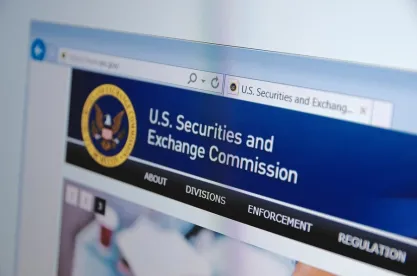Last week, the US Securities and Exchange Commission’s (SEC) Investor Advisory Committee (IAC) issued recommendations that the SEC impose new restrictions and disclosure requirements for trading plans that afford executives and other insiders the “good faith” defense against allegations of insider trading. The IAC’s actions are expected to add momentum to SEC Chairman Gary Gensler’s recent direction to SEC staff to present recommendations to “freshen up” Exchange Act Rule 10b5-1 by tightening its restrictions.
IN-DEPTH
Rule 10b5-1 was established as a safe harbor to allow an executive or other insider to trade shares in their company according to a written plan adopted while not in possession of material, non-public information without fear of violating insider trading rules—even when trades made pursuant to the plans were executed while the executive or other insider was in possession of material, non-public information. However, the IAC cited research it believes supports concerns that “some plans are used to engage in opportunistic trading behavior that contravenes the intent behind the rule.” Indications that plans have not been used in good faith prompted the IAC to recommend the following:
-
A “cooling off” period of at least four months between plan adoption and trading or modification. This would prevent a plan from being adopted in the same quarter that the trades were executed.
-
Prohibiting “overlapping plans.” Allowing only one active plan “would signal to the market that a plan was entered into in good faith.”
-
Requiring electronic submission of Form 144. Currently, the forms can be mailed to the SEC and are destroyed after 90 days, which the IAC believe makes it more difficult to detect insider trading activities.
-
Disclosing in Proxy statements the number of shares scheduled for sale by each of the named executive officers.
-
Disclosing on Form 8-K the adoption, modification or cancellation of 10b5-1 plans and the number of shares covered on a timely basis.
-
Ensuring that all companies with listed American Depository Receipts (ADRs) and American Depository Shares (ADS) filing Form 20-Fs are subject to Form 4 reporting requirements.
This focus on potential abuse of trading plans coincides with an aggressive enforcement approach to insider trading. For example, the SEC recently employed the novel “shadow trading” theory that possessing confidential information about one company precludes trading in the securities of a competitor. It is fair to say that the SEC is scrutinizing all aspects of insider trading, including potential challenges to the good faith defense under Rule 10b5-1 plans.
The Dodd-Frank Act established the IAC to advise the SEC on regulatory priorities and to promote investor confidence. Its members are drawn from a cross section of the finance, academic and public investor communities. The IAC is expected to formally approve these recommendations at its meeting on September 9, 2021, and its report is replete with more than 30 footnotes to congressional materials, previous proposed rulemaking, academic papers and media reports.






 />i
/>i
